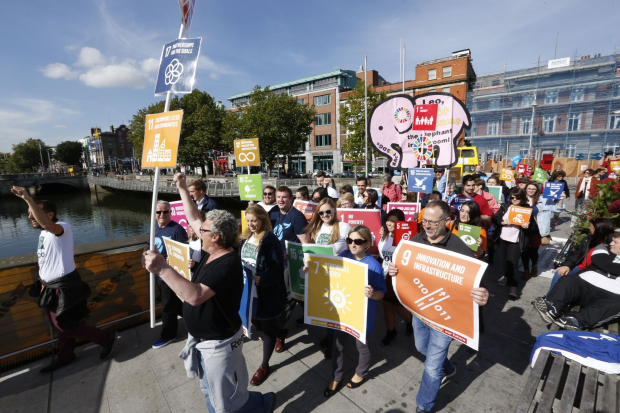Campaigning for Change: Build your network, know your terrain
News details

From ending foot binding in China to wearing a helmet while riding your bike. Successful transformative campaigns create an issue where there was none before – where the majority of society accepted the prevailing situation as the norm, as ‘just the way that things are done’. Feet were bound and kids rode bikes with the wind in their hair.
The Development Education and Awareness Raising Programme funds projects that span the length and breadth of Europe. Many are campaigning and advocacy projects, seeking to make positive social change, like the ones that made foot-binding a thing of the past or protective headgear for cyclists de rigueur.
“We saw with the last Commission that the SDGs were not a big issue,” said Nadège Lharaig, from the European Environmental Bureau and lead on the Make Europe Sustainable for All project. “But with the new Commission in 2019, there was an opportunity as the new President said she would mainstream the SDGs in the targets of every Directorate General. So, we sent all the Commissioners a personalised letter.”
Recently, DEAR projects have campaigned for fairer global supply chains for tropical fruit or lifestyle changes that contribute to reducing environmental impact or urged Europeans to learn from indigenous communities - to highlight just a few. Such campaigns can make Europeans’ lives and the society in which we all live, a better, more equitable place. Pulling off an effective campaign is challenging, but there are some actions that can contribute to success.
“We want to tap into the learning from your projects: what worked - and what didn’t,” said Harm-Jan Fricke, Team Leader of the DEAR Support Team at the opening of the Learning and Development Hub on Policy Change, which took place online due to COVID restrictions.
Some 14 representatives from six projects that are in their final months of operation, tuned in for two hours of discussion and debate. The Hub, which had been scheduled to take place in London but moved online over health concerns and travels restrictions, provided a fruitful opportunity to harvest some of the main lessons learned on how to set up and operate a successful DEAR campaign.
Build your network
No matter whether you’re working with NGOs, CSOs or local government authorities. Even if you’re focused on political or private sector participation with corporates, trade regulators or policy makers. The advice was unanimous: invest time and energy in building a network around your issue.
A strong and diverse network can underpin your project goals because:
- The more organisations/ individuals in your network, the more power you have to deliver change.
- The broader this network is, the more likely it is to be successful, as you are able to demonstrate that your issue resonates with a wide slice of European society.
- A network can enable your campaign/ movement to continue to make a difference, long after your project is over.
- Your network might become a consultative body, a specialist group on your chosen issue, that can support action for change with knowledge. Who knows, maybe the consultative body may take on an official role or function?
- If you’re finding it difficult to get the time of day from journalists, find a way to fit your issue into their schedule – offer them a briefing over a courtesy breakfast or lunch event.
- Amplify your network through social media.
“We have a lot of experience of collaborating with retailers to improve their traceability mechanisms for seafood,” said Axel Hein from WWF Austria and lead partner of the Fish Forward project.
And, don’t shy away from bringing in corporate partners, as with some audiences, such as political bodies, the opinion of the business community might carry a lot more weight.
Know your terrain
One way to generate cohesiveness in your network, is to establish yourself as an ‘expert’ in your chosen issue. Do the research - or pay others to do the research for you. Whichever route you choose, ensure that when you call for change, your argument is well researched and based on rock-solid information.
- With strong data to support your cause, your project is more likely to attract champions who are perhaps already sympathetic to your arguments but lack access to the data they need to push for change (think MEPs or other elected officials).
- Leverage any knowledge, expertise or reputation you or your partners can claim on your issue.
- Work with your target, not against them. For example, don’t accuse corporates of doing it all wrong. Show them, through well researched findings, how they can change their operations to address your issue or cause.
- Shifts in public opinion, events in the news or political change can shift the balance and might create an opportunity to move your issue forward. Make sure your research stays up-to-date, be flexible and aim to be topical.
And don’t forget, part of knowing your terrain includes researching your campaign targets. Who are they? What motivates them? How can you reach them? What will shift their position and trigger them to act? The more you understand their motivations and interests, the more likely you will be able to speak their language and run an impactful campaign.
A full write up of the Hub findings is available here.
Log in with your EU Login account to post or comment on the platform.